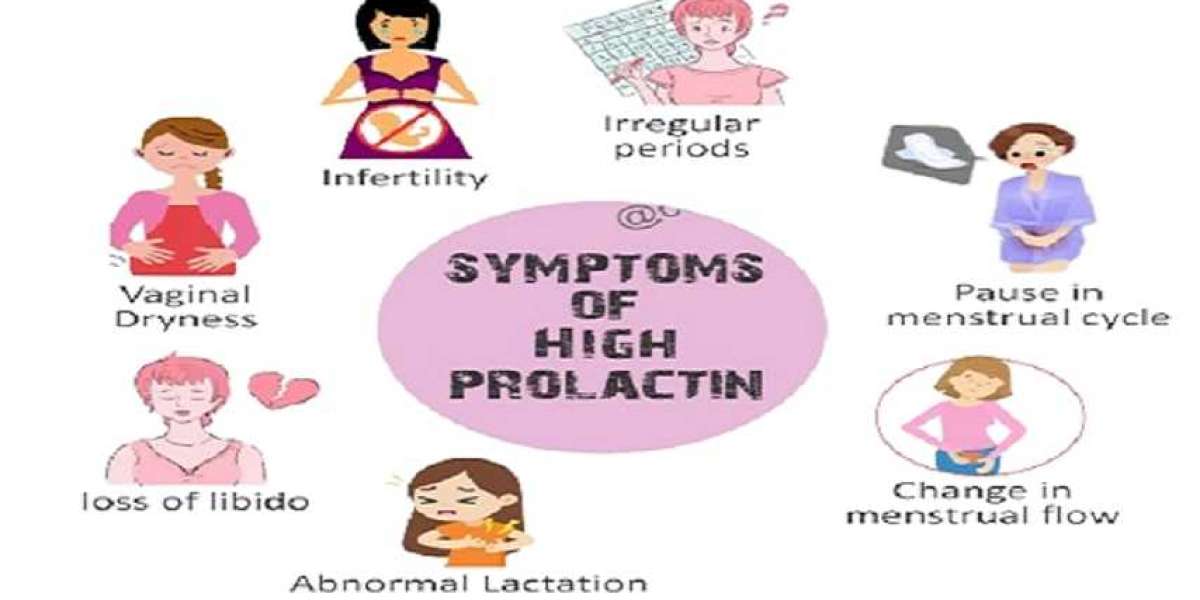A dangerous disorder that may lie in the body and go undiagnosed is hyperprolactinemia, which is defined by increased levels of the hormone prolactin in the blood. It is essential to comprehend this ailment in order to recognize it early and treat it effectively. Examining hyperprolactinemia illuminates the complex relationship between hormone levels and general health, from its origins and risk factors to the symptoms and indicators that need care. This article explores the complexities of hyperprolactinemia, including information on diagnosis, available treatments, and the significance of lifestyle changes in managing this often disregarded medical condition.
Definition of High Prolactinomas
You may have wondered, "Is that a new superhero?" when you heard the phrase hyperprolactinemia bandied around. Not exactly, however. Your body says, "Hey, let's crank up the production of prolactin, the milk-making hormone, a bit too much," which is known as hyperprolactinemia. Monitoring this hormonal imbalance is crucial since it may lead to many problems.
Cabergoline 0.5mg Tablet is a dopamine agonist. It is used to treat elevated levels of prolactin. It may also assist halt breast milk production in situations of stillbirth, abortion, or miscarriage. Cabergoline 0.5 Tablet should be taken with meals, but only at the same time for the best results. It should be interpreted as your physician's advice.
Prolactin's Function in the Body
Prolactin typically resides in the pituitary gland, where it does its job and aids in the production of milk in nursing mothers. However, abnormally high prolactin levels may interfere with conception, menstruation, and even bone health. It's essentially a hormonal party crasher, so be cautious around them.
Disorders Associated with Hyperprolactinemia
Prolactin levels may spike due to a number of diseases, including pituitary tumors, thyroid issues, or renal illness. These conditions behave like the sparkplugs of an estrogenic frenzy. It's as if they are pressing the "up" button on the elevator of prolactin without your permission.
Drugs and Additional Elements that May Increase Prolactin Levels
How ironic it is all of this! Antidepressants and antipsychotics are examples of helpful drugs that might secretly increase prolactin levels. An additional way that stress, exercise, or even injuries to the chest wall might say, "Hey prolactin, let's party!" So, be cautious about what you put into your body and the challenges that life presents.
Symptoms in the body
Uninvited physical symptoms such as irregular periods, problematic breast milk production while not pregnant or nursing, or even visual problems might arise when hyperprolactinemia crashes your hormonal party. Your body seems to be telling you, "Houston, we have a prolactin problem."
Symptoms of Emotion and Psychology
There is more to the hormonal rollercoaster that is hyperprolactinemia than meets the eye. It may also interfere with your emotions, causing anxiety, depressive symptoms, or even mood swings. It feels as if your hormones are using your body to stage a Shakespearean play without your consent.
Effects on Health of the Reproductive System
Yes, the hormonal disorder known as hyperprolactinemia may seriously damage your reproductive system, leading to erectile dysfunction, poor libido, and infertility. It seems as if your desires to have a family are being cruelly mocked by your hormones.
Effects on Bone Health Over Time
Prolactin may negatively impact bone health and raise the risk of osteoporosis and bone fractures when it chooses to have an endless party in your body. Therefore, it seems as if your bones are asking for some quiet time.
Cabergoline Treat high concentration of the hormone prolactin in the blood is known as hyperprolactinemia. During breastfeeding, the pituitary gland releases the hormone prolactin, which primarily boosts milk production. Among the many health issues that may arise from an abnormal rise in prolactin levels are menstrual cycle abnormalities, infertility, and erectile dysfunction. Cabergoline eliminates these issues by regulating prolactin levels.
Making a hyperprolactinemia diagnose
Physicians may prescribe certain tests and treatments to measure the body's prolactin levels in order to diagnose hyperprolactinemia. To ascertain the underlying reason of increased prolactin levels, these examinations may include imaging investigations as well as blood testing.
Diagnostic Procedures and Tests
Prolactin levels in the body are often determined by blood testing. Moreover, physicians could advise imaging studies like magnetic resonance imaging (MRI) to look for pituitary gland anomalies, which are often the cause of hyperprolactinemia.
Understanding Prolactin Amounts
Knowing what is normal and what might be hyperprolactinemia are important for interpreting prolactin levels. Many things, such as medication, stress, and underlying medical disorders, may result in elevated prolactin levels. Healthcare professionals must interpret these values in light of the patient's general health.
Options for Treatment and Management Techniques
In order to treat the underlying cause of hyperprolactinemia and the symptoms brought on by elevated prolactin levels, managing the condition often entails combining medication and lifestyle modifications.
Drugs for the Hyperprolactinemia
Drugs like dopamine agonists are often used to reduce the body's levels of prolactin. These drugs function by activating dopamine receptors in the brain, which aid in controlling the release and synthesis of prolactin.
Modifications to Lifestyle to Encourage Treatment
Modifications in lifestyle may be very helpful in controlling hyperprolactinemia in addition to medication. A balanced diet, frequent exercise, and stress management are just a few of the healthy decisions that may enhance treatment outcomes and general wellbeing.
Modifications to Lifestyle to Aid in Recovery
Adopting good lifestyle practices that support hormonal balance and general health may aid in the recovery process from hyperprolactinemia.
Dietary Guidelines and Nutrition Advice
Hormonal balance and general wellbeing may be enhanced by eating a diet high in fruits, vegetables, healthy grains, and lean meats. For those who have hyperprolactinemia, avoiding processed foods and consuming less sugar and caffeine may also be helpful.
Exercise and Techniques for Stress Reduction
Frequent exercise may reduce stress and assist control hormone levels, both of which can improve hyperprolactinemia treatment. Deep breathing exercises, yoga, and meditation are a few other practices that may assist in managing stress and promoting the condition's healing.
To sum up, increasing awareness of hyperprolactinemia is critical to encouraging early action and enhancing the prognosis for those who are impacted by this illness. People may take charge of their health and well-being by being aware of the subtleties of hyperprolactinemia. With a combination of medication, lifestyle modifications, and continued support, hyperprolactinemia may be managed and a healthy future can be worked towards.








